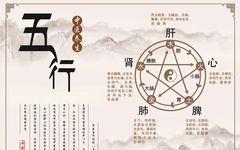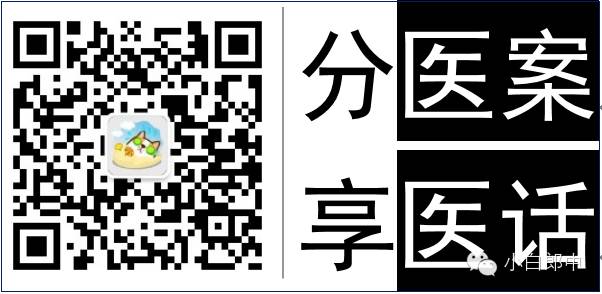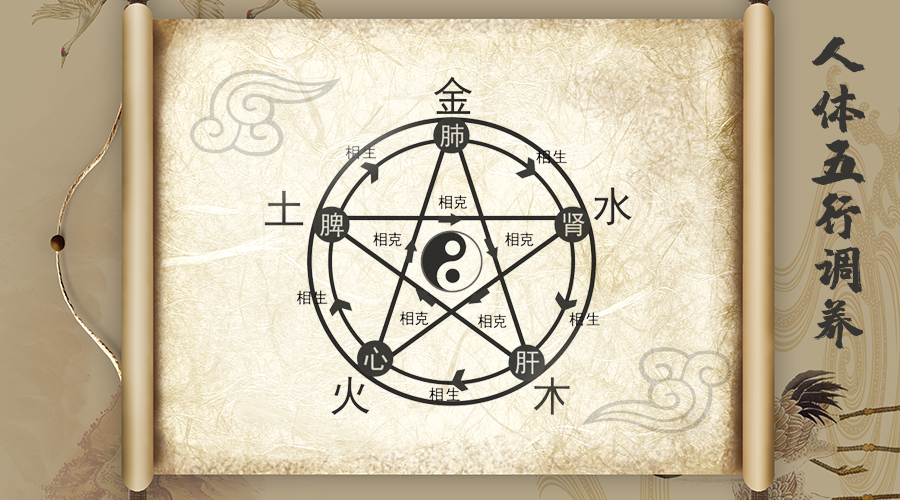
The five organs are all “born with a purpose,” each fulfilling its role.
As noted by Zhang Zhizong in the Qing Dynasty in “Lüshan Hall Classifications”: “The energies of the five organs are all interconnected.” The five organs have an inherent connection in physiological activities and pathological changes, forming a relationship of mutual generation and mutual restriction.
1. The Mutual Generation of the Five Organs in TCM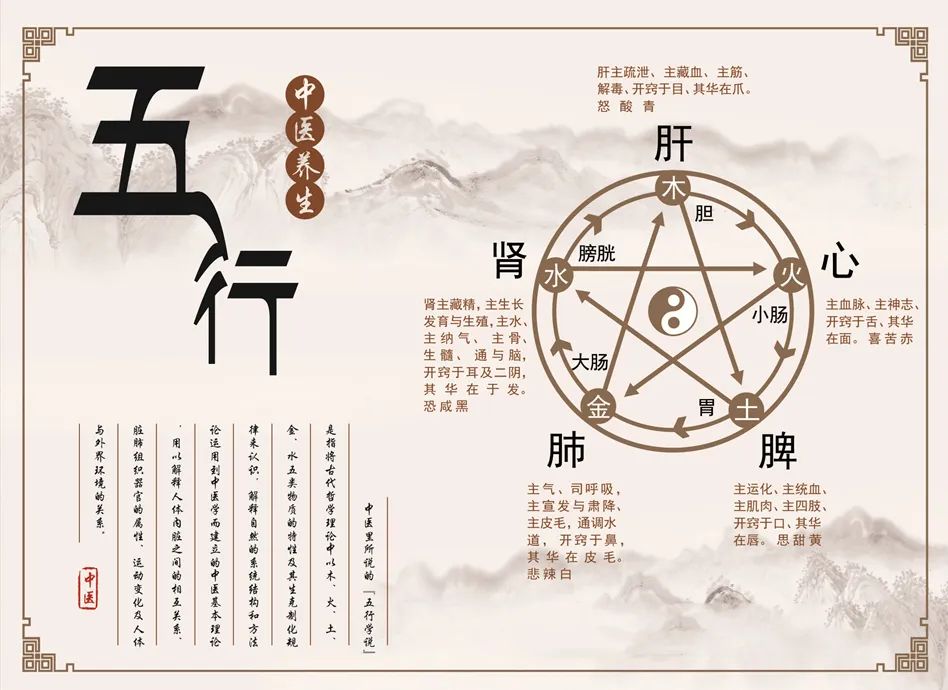 Due to the correspondence of the five elements (Wood, Fire, Earth, Metal, Water) to the five organs (Liver, Heart, Spleen, Lung, Kidney), TCM states that “Wood generates Fire, Fire generates Earth, Earth generates Metal, Metal generates Water, Water generates Wood.” Here, “generate” implies nurturing, promoting, assisting, and supporting. Sometimes, this relationship is referred to as a mother-child relationship, similar to a mother giving birth to a child.For example, Fire generates Earth; Fire is the mother of Earth. Correspondingly, the Heart is the “mother” of the Spleen, as the Heart can support and promote the function of the Spleen.If a patient with myocardial infarction collapses in the bathroom, one possibility is excessive straining during defecation;another possibility is overeating. In TCM, Qi is divided into Yuan Qi (Original Qi), Zong Qi (Ancestral Qi), Ying Qi (Nutritive Qi), and Wei Qi (Defensive Qi), all emphasizing that life depends on Qi. If one overeats, the Spleen and Stomach will require more Qi to digest the food.We know that Heart Fire generates Spleen Earth, forming a “mother-child relationship” between the Heart and Spleen. If the Spleen and Stomach require more Qi during digestion, they will “steal Qi” from the Heart, a phenomenon known in TCM as “the child stealing the mother’s Qi,” which can lead to insufficient Heart Qi and subsequently heart disease.Therefore, patients with heart disease must pay attention to two points: first, avoid constipation; second, it is best to eat until 70-80% full.In the context of seasonal health, the principle of mutual generation among the five organs is even easier to understand.For instance, according to TCM, the Liver, Heart, Spleen, Lung, and Kidney correspond to the five seasons: Spring, Summer, Late Summer, Autumn, and Winter. After Spring comes Summer; Wood generates Fire, meaning the Liver generates the Heart. If the Liver stores blood well in Spring, it can alleviate the excessive heat and Yang Qi in Summer, leading to a balance of Qi and blood. Similarly, after Autumn comes Winter; Metal generates Water, and the clear Qi of the Lung allows the fluids to descend and nourish the Kidney, laying a good foundation for the storage of Yang Qi in Winter.2. The Mutual Restriction of the Five Organs in TCM
Due to the correspondence of the five elements (Wood, Fire, Earth, Metal, Water) to the five organs (Liver, Heart, Spleen, Lung, Kidney), TCM states that “Wood generates Fire, Fire generates Earth, Earth generates Metal, Metal generates Water, Water generates Wood.” Here, “generate” implies nurturing, promoting, assisting, and supporting. Sometimes, this relationship is referred to as a mother-child relationship, similar to a mother giving birth to a child.For example, Fire generates Earth; Fire is the mother of Earth. Correspondingly, the Heart is the “mother” of the Spleen, as the Heart can support and promote the function of the Spleen.If a patient with myocardial infarction collapses in the bathroom, one possibility is excessive straining during defecation;another possibility is overeating. In TCM, Qi is divided into Yuan Qi (Original Qi), Zong Qi (Ancestral Qi), Ying Qi (Nutritive Qi), and Wei Qi (Defensive Qi), all emphasizing that life depends on Qi. If one overeats, the Spleen and Stomach will require more Qi to digest the food.We know that Heart Fire generates Spleen Earth, forming a “mother-child relationship” between the Heart and Spleen. If the Spleen and Stomach require more Qi during digestion, they will “steal Qi” from the Heart, a phenomenon known in TCM as “the child stealing the mother’s Qi,” which can lead to insufficient Heart Qi and subsequently heart disease.Therefore, patients with heart disease must pay attention to two points: first, avoid constipation; second, it is best to eat until 70-80% full.In the context of seasonal health, the principle of mutual generation among the five organs is even easier to understand.For instance, according to TCM, the Liver, Heart, Spleen, Lung, and Kidney correspond to the five seasons: Spring, Summer, Late Summer, Autumn, and Winter. After Spring comes Summer; Wood generates Fire, meaning the Liver generates the Heart. If the Liver stores blood well in Spring, it can alleviate the excessive heat and Yang Qi in Summer, leading to a balance of Qi and blood. Similarly, after Autumn comes Winter; Metal generates Water, and the clear Qi of the Lung allows the fluids to descend and nourish the Kidney, laying a good foundation for the storage of Yang Qi in Winter.2. The Mutual Restriction of the Five Organs in TCM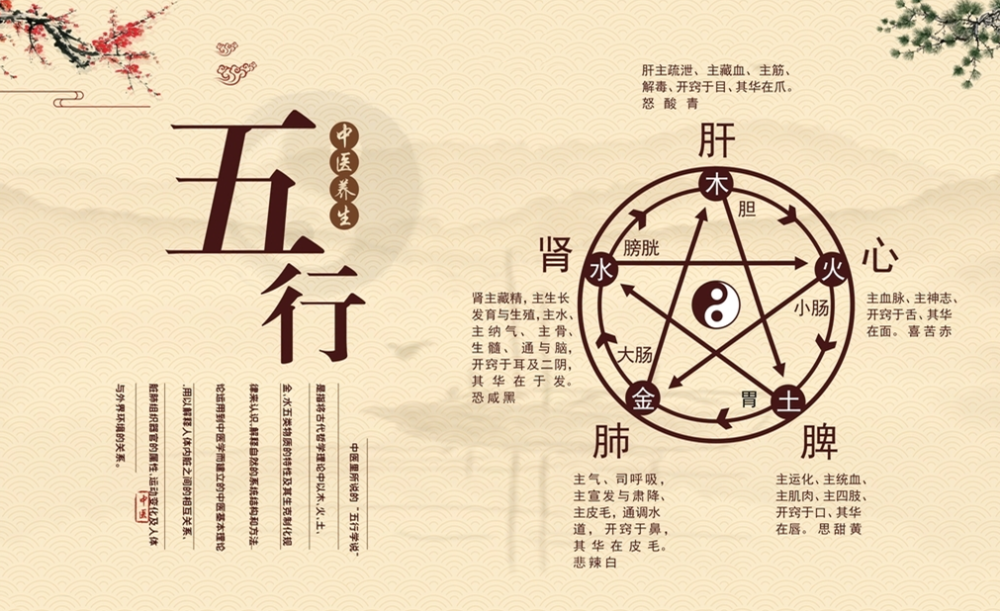 “Wood restrains Earth, Earth restrains Water, Water restrains Fire, Fire restrains Metal, Metal restrains Wood.”This manifests in the human body as:The clear Qi of the Lung (Metal) can suppress the excessive Yang of the Liver (Wood), meaning Metal restrains Wood; the smooth flow of the Liver (Wood) can relieve the stagnation of the Spleen (Earth), meaning Wood restrains Earth; the transformation of the Spleen (Earth) can prevent the flooding of the Kidney (Water), meaning Earth restrains Water; the upward movement of the Kidney (Water) can prevent the excessive heat of the Heart (Fire), meaning Water restrains Fire; the Yang heat of the Heart (Fire) can restrict the excessive clearing of the Lung (Metal), meaning Fire restrains Metal.The application of the mutual generation and restriction of the five organs in disease prevention and treatment is emphasized in TCM today, where “preventing disease before it occurs” is a primary focus.As stated in the “Jin Kui Yao Lue”: “When observing liver disease, one should recognize that liver issues can easily affect the Spleen, and thus one should first strengthen the Spleen.”This means that when liver disease is present, it is important to recognize that liver issues can easily affect the Spleen, and therefore, while treating the liver, one should first tonify the Spleen. Since Wood restrains Earth, liver disease can covertly harm the Spleen. A disease in one organ can influence others.This reflects the principle of “preventing disease before it occurs,” aiming to ensure that the Spleen’s righteous Qi is robust and not subject to invasion. Conversely, if one sees liver disease and does not recognize the need to tonify Spleen Qi, but only treats the liver, this lacks a holistic treatment approach and will naturally not yield satisfactory results. Wood generates Fire, and the Liver is the mother of the Heart; liver disease can also affect the Heart, and this principle applies to other organ pathologies as well.According to the mutual generation relationship of the five elements, TCM has the treatment principle of “tonifying the mother and draining the child,” meaning “if deficient, tonify the mother; if excessive, drain the child.” For example, if the Liver is deficient, tonify the Kidney, as Water generates Wood, and the Kidney is the mother of the Liver. Thus, tonifying Kidney Water can nourish Liver Wood, a method known in TCM as “nourishing Water to contain Wood,” which is suitable for conditions of Kidney Yin deficiency leading to insufficient Liver Yin.Liver and Kidney Yin deficiency is the fundamental pathogenesis of diabetes, hypertension, and stroke; therefore, these conditions require simultaneous treatment of the Liver and Kidney. For instance, if there is excessive Liver Fire, it is essential to maintain a calm mood, and one can consume bitter melon to reduce Heart Fire.Based on the restriction relationship, TCM has the treatment principle of “suppressing the strong and supporting the weak,” meaning to drain the strong restrainer and tonify the weak restrained. For example, if the Liver is restraining the Spleen, and Liver Qi is excessive, it must be drained, while Spleen Qi is deficient and must be tonified. This balance of draining and tonifying allows for harmony between Yin and Yang, leading to health.In summary, in the holistic view of TCM,the human body is a unified entity centered around the Heart, with the five organs being interdependent, each with its own responsibilities, yet none can exist without the others.
“Wood restrains Earth, Earth restrains Water, Water restrains Fire, Fire restrains Metal, Metal restrains Wood.”This manifests in the human body as:The clear Qi of the Lung (Metal) can suppress the excessive Yang of the Liver (Wood), meaning Metal restrains Wood; the smooth flow of the Liver (Wood) can relieve the stagnation of the Spleen (Earth), meaning Wood restrains Earth; the transformation of the Spleen (Earth) can prevent the flooding of the Kidney (Water), meaning Earth restrains Water; the upward movement of the Kidney (Water) can prevent the excessive heat of the Heart (Fire), meaning Water restrains Fire; the Yang heat of the Heart (Fire) can restrict the excessive clearing of the Lung (Metal), meaning Fire restrains Metal.The application of the mutual generation and restriction of the five organs in disease prevention and treatment is emphasized in TCM today, where “preventing disease before it occurs” is a primary focus.As stated in the “Jin Kui Yao Lue”: “When observing liver disease, one should recognize that liver issues can easily affect the Spleen, and thus one should first strengthen the Spleen.”This means that when liver disease is present, it is important to recognize that liver issues can easily affect the Spleen, and therefore, while treating the liver, one should first tonify the Spleen. Since Wood restrains Earth, liver disease can covertly harm the Spleen. A disease in one organ can influence others.This reflects the principle of “preventing disease before it occurs,” aiming to ensure that the Spleen’s righteous Qi is robust and not subject to invasion. Conversely, if one sees liver disease and does not recognize the need to tonify Spleen Qi, but only treats the liver, this lacks a holistic treatment approach and will naturally not yield satisfactory results. Wood generates Fire, and the Liver is the mother of the Heart; liver disease can also affect the Heart, and this principle applies to other organ pathologies as well.According to the mutual generation relationship of the five elements, TCM has the treatment principle of “tonifying the mother and draining the child,” meaning “if deficient, tonify the mother; if excessive, drain the child.” For example, if the Liver is deficient, tonify the Kidney, as Water generates Wood, and the Kidney is the mother of the Liver. Thus, tonifying Kidney Water can nourish Liver Wood, a method known in TCM as “nourishing Water to contain Wood,” which is suitable for conditions of Kidney Yin deficiency leading to insufficient Liver Yin.Liver and Kidney Yin deficiency is the fundamental pathogenesis of diabetes, hypertension, and stroke; therefore, these conditions require simultaneous treatment of the Liver and Kidney. For instance, if there is excessive Liver Fire, it is essential to maintain a calm mood, and one can consume bitter melon to reduce Heart Fire.Based on the restriction relationship, TCM has the treatment principle of “suppressing the strong and supporting the weak,” meaning to drain the strong restrainer and tonify the weak restrained. For example, if the Liver is restraining the Spleen, and Liver Qi is excessive, it must be drained, while Spleen Qi is deficient and must be tonified. This balance of draining and tonifying allows for harmony between Yin and Yang, leading to health.In summary, in the holistic view of TCM,the human body is a unified entity centered around the Heart, with the five organs being interdependent, each with its own responsibilities, yet none can exist without the others.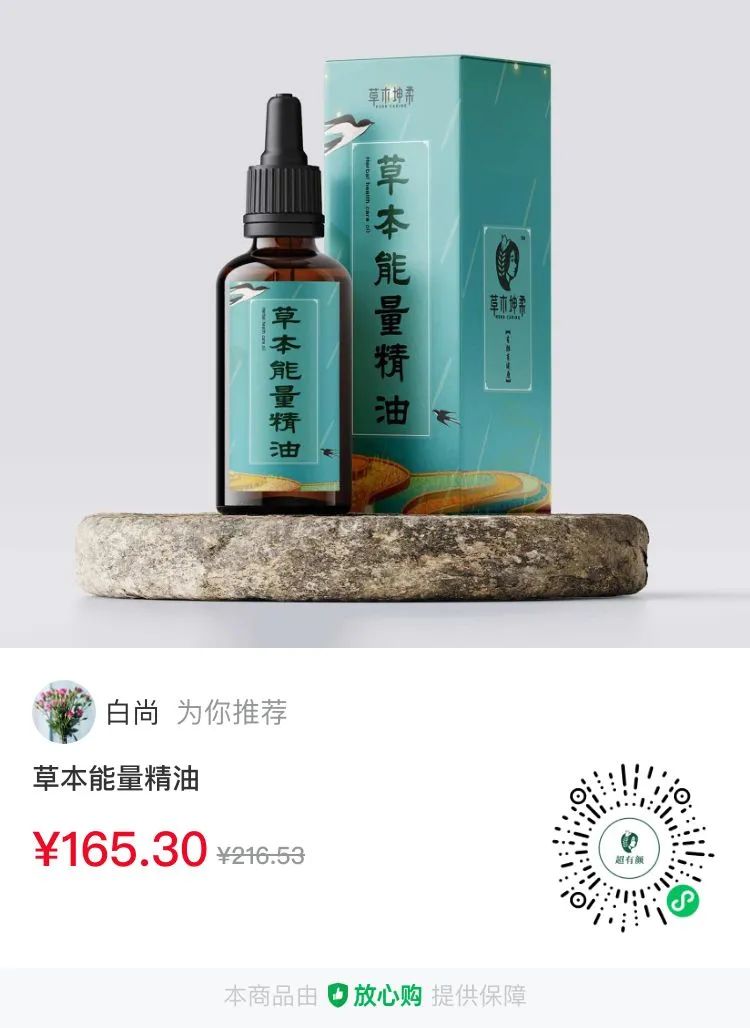 Product Introduction: Strengthens the Spleen and Stomach, promotes the transformation of the Spleen and Stomach, abdominal massage can enhance appetite, assist in bowel movements, dry dampness and stop diarrhea, reduce abdominal bloating, and is gentle without causing heat.⊙ The content of this article is for clinical thought reference only; non-TCM professionals should not attempt to self-medicate.⊙ Some images and texts are sourced from the internet; if there is any infringement, please contact us for removal.You May Also Like, click to read the original text:A powerful formula that can treat cervical spondylosis, lumbar spondylosis, and even knee and heel pain!Staying up late, feeling exhausted, are you Yin deficient? With the right method, you can adjust it back in a week!//////////
Product Introduction: Strengthens the Spleen and Stomach, promotes the transformation of the Spleen and Stomach, abdominal massage can enhance appetite, assist in bowel movements, dry dampness and stop diarrhea, reduce abdominal bloating, and is gentle without causing heat.⊙ The content of this article is for clinical thought reference only; non-TCM professionals should not attempt to self-medicate.⊙ Some images and texts are sourced from the internet; if there is any infringement, please contact us for removal.You May Also Like, click to read the original text:A powerful formula that can treat cervical spondylosis, lumbar spondylosis, and even knee and heel pain!Staying up late, feeling exhausted, are you Yin deficient? With the right method, you can adjust it back in a week!//////////

